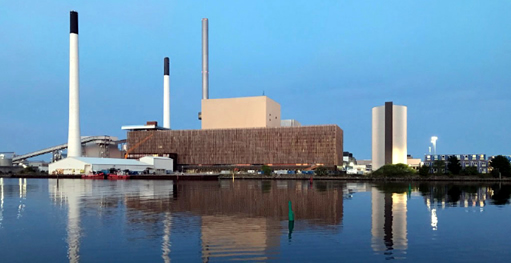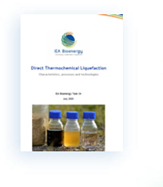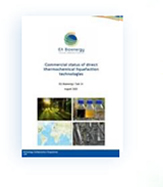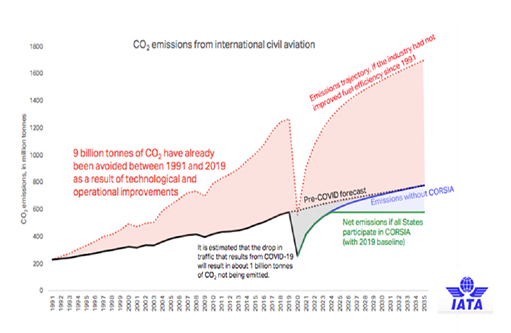 |
|
September 2020
|
|
|
|
|
|
ExCo 86
Due to the ongoing Covid-19 pandemic, the ExCo86 meeting will take place as a Virtual meeting in three sessions on the 21-22 October. |
|
|
|
|
|
|
|
|
The Use of Forest Biomass for Climate Change Mitigation: Dispelling Some
Misconceptions

Articles and statements in the media have raised concerns over the climate effects of bioenergy from managed forest. As some of these statements seem to reflect misconceptions about forest bioenergy, IEA Bioenergy has prepared a brief document presenting key facts about the use of forest biomass for climate change mitigation. Concluding, the most important climate change mitigation measure is the transformation of energy, industry and transport systems so that fossil carbon remains in the ground. Bioenergy plays a strategic role in supporting this transformation. Switching from fossil fuels to biomass from sustainably-managed forests can reduce atmospheric CO2 over time scales relevant to climate stabilisation.

|
|
|
|
|
|
|
|
|
August 2020 – Coal
Combustion in Copenhagen is
History

The inauguration of Unit 4 at the Amager plant in Copenhagen on August 26th marked the end of coal combustion to generate power and district heating in Copenhagen and an important step towards climate neutrality of the capital. Unit 4 is one of the World’s largest circulating fluidised bed boilers operating solely on wood chips and has a capacity of 400 MJ/s heat and 150 MW electricity with an option to bypass the turbine to generate 550 MJ/s heat when needed. The unit replaces the coal fired Unit 3 from 1989 that was the last coal fired unit in operation in Copenhagen.
|
|
|
|
|
|
|
|
|
Task 32 & 40
Workshop on Residential Wood Combustion
The slides from the Task 32 workshop on Residential Wood Combustion are available online here. The workshop was held as a parallel session at the Central European Biomass Conference in Graz, Austria in January 2020.

Photo: Danish Technological Institute
Workshops on Wood Chips and on Pulverised Fuel
The Task 32 and Task 40 workshops on wood chips and on pulverised fuel that were planned to be held in Copenhagen in May 2020 have been postponed to the 2nd quarter of 2021 with dates to be advised in due course.
|
|
|
|
|
|
|
|
|
Task 34

Direct Thermochemical Conversion Brochure
A new direct thermochemical conversion (DTL) brochure was published By Task 34 to present to a broader audience some of the characteristics of different DTL processes, options for conditioning of the bio-oil, and perspectives of DTL as key enabling technology to access biogenic resources for a future bioeconomy.


Commercial Status of Direct Thermochemical Liquefaction Technologies
An updated summary of industrial scale and close-to market direct thermochemical conversion facilities (fast pyrolysis and hydrothermal liquefaction) has been compiled by Task 34 to showcase current industrial activities in this evolving field of biomass conversion.

|
|
|
|
|
|
|
|
|
Task 39
Biofuels Policies that Have Encouraged their Production and Use: An International Perspective
A manuscript entitled “Biofuels policies that have encouraged their production and use: An international perspective”, based on the Task’s Implementation Agenda report will be published in the Energy Policy Journal. This manuscript summarizes the policies currently used to promote the greater production and use of biofuels in Task 39’s member countries as well as India (which has since become a member of Task 39) and China. The full report and its executive summary are available on the Task 39’s website.
Webinar: “Crystal Ball Gazing: How Do we Decarbonise Long Distance Transport during/after COVID-19”
Task 39 organized a webinar on 30 June, with a focus on “decarbonise long distance transport”. It included panel members fromthe oil refining, aviation, marine, rail/trucking and feedstock sectors who were asked to collectively discuss the opportunities-and-challenges of decarbonising the longdistance transport sector during-and-after the CoVid pandemic. The approximately 180 participants “zoomed-in” from North and South America as well as Europe.
A recording of the webinar and the presentation slides are posted on Task 39’s website. By all accounts, it was a big success!

CO2 emissions from international civil aviation, before and after COVID-19 pandemic- presented at virtual Panel Discussion: “Crystal ball gazing: how do we decarbonise long distance transport during/after COVID-19”, held on 30 June, 2020.
Updates to Task 39’s Demonstration Plant Database
The Task 39 pilot and demonstration plants database was recently updated. Information on all European facilities (121) were verified and updated. 226 entries are currently active in the online database. Technologies covered include gasification, fermentation, hydrotreatment, fast pyrolysis, hydrothermal liquefaction and lignin depolymerisation. The updated database is available here.
|
|
|
|
|
|
|
|
|
Task 40
June 2020 saw the publication of the report “Deployment of BECCS/U Value Chains – Technological Pathways, Policy Options and Business Models”, which is the first deliverable from an ongoing IEA Bioenergy inter-task project called “Deployment of BECCS/U Value Chains” which is led by IEA Bioenergy Task 40 and with Task 36 and Task 45 as partners. The report focuses on the potential and challenges associated with deploying BECCS systems and value chains in the near to medium term. It provides a brief overview of different technological options for capture, transport and storage of CO2, and offers insights into how BECCS business models could be set up. Furthermore, the report also discusses role of public policy in this setting, and how bioenergy with carbon capture and utilization (BECCU) could play a role in enabling BECCS deployment. The report was also presented in a well-attended IEA Bioenergy Webinar on 16 June, a recording of which is available here.
|
|
|
|
|
|
|
|
|
Task 44
On January 24th, 2020, Task 44 hosted a “Flexible Bioenergy Workshop” in conjunction with the Central European Biomass Conference in Graz, Austria. The Event hosted six different presenters who discussed the needs of future energy systems that operate with increased variability and how the flexibility offered by bioenergy could meet those demands. The presentations from this event can be found here. |
|
|
|
|
|
|
|
|
Collaborations with
International Bodies
IEA Bioenergy experts, as part of an ad-hoc external Network of Experts (NoE), contribute to a new European Commission publication ‘Future transitions for the Bioeconomy towards Sustainable Development and a Climate-Neutral Economy – Knowledge Synthesis Final Report’.

|
|
|
|
|
|
|
|
|
Events
IEA Bioenergy eWorkshop – Contribution of sustainable biomass and bioenergy in INDUSTRY TRANSITIONS towards a circular economy
According to IEA’s Sustainable Development Scenario, the use of bioenergy in industry will grow substantially, from approximately 8 EJ today to 24 EJ in 2060. This implies that the industrial sector will be the greatest user of bioenergy after the transport sector, replacing fossil sources in both lowand medium-temperature applications, as well as for higher-temperature applications. Moreover, in the transition to a circular economy, which needs to be increasingly based on recycling and renewable resources, chemicals and materials produced from biomass will play a key role in chemical and process industries.
The workshop intends to share examples of strategies and initiatives of biomass use in industries in their transition to a more circular economy, thereby increasingly moving towards recycling and renewable resources.
To facilitate remote attendance, the online workshop is split up in threeparts, with separate focus:
- Monday 19 Oct, 2-4 pm CEST: Biomass for Medium and High Temperature Heat in Industry
- Tuesday 20 Oct, 10-12 am CEST: Biomass in Energy Intensive Industry Sectors Like Steel and Cement Industries
- Tuesday 20 Oct, 2-4 pm CEST: Biomass in Chemical/Process Industries

Workshops on REDII Implementation and Delivering Good Woody Biomass
IEA Bioenergy Tasks 40 and 45 in association with SBP Technical and the European Technology and Innovation Platform (ETIP) have organised a series of free online workshops devoted to exploring REDII implementation and delivering good woody biomass.
The workshops are as follows:
- Online Workshop 1: Ongoing Developments in EU Member States and the Role of REDII, 5 October 2020, 15.00 -18.00 CEST
- Online Workshop 2: Biomass Supply from In- and Outside the EU, 19 October 2020, 15.00-18.00 (CEST)
- Online Workshop 3: How to Ensure that Using Biomass Maintains and Protects Biodiversity, 9 November 2020, 15.00-18.00 (CET)
- Online Workshop 4: Carbon, Forests and Climate Impacts of Woody Biomass, 30 November,2020 15.00-18.00 CET
- Online Workshop 5: Social Impacts of Woody Biomass, 20 January 2021, 15.00-18.00 CET.
Registration for the workshops is now open.

IEA Bioenergy Webinar Save the Date
A free IEA Bioenergy Webinar on “The Contribution of Advanced Renewable Transport Fuels to Transport Decarbonisation in 2030 and beyond” will be held on 17th November 2020.

|
|
|
|
|
|
|
